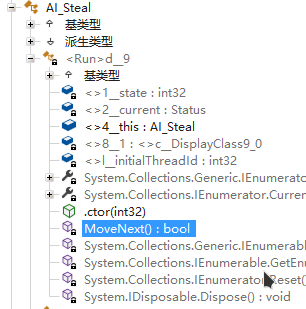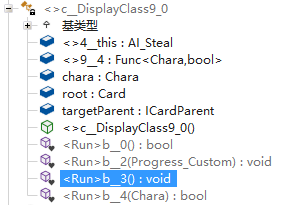Harmony Patch
... is very well documented here:
But sometimes we encounter edge cases, let's break them down today.
Enumerator
An enumerator is a method that returns IEnumerable<T> or IEnumerator and contains yield statement. They are also used as coroutines in Unity.
public override IEnumerable<Status> Run()
{
yield return Cancel();
}Even though they look like normal methods in decompiler, they are actually wrapped up as a compiler generated nested class within MoveNext() method. When we iterate the enumerator, it's in fact invoking the MoveNext() method for us, until the yield state exhausts.
Patch
To patch these methods, supply MethodType.Enumerator argument to the [HarmonyPatch] attribute, as follows:
// in a patch class
[HarmonyPostfix]
[HarmonyPatch(typeof(AI_Fuck), nameof(AI_Fuck.Run), MethodType.Enumerator)]
internal static void OnRunMoveNext();However, here's the catch: MoveNext() is invoked repeatly until the yield state exhausts, so within the original method, each time it yields, the patch will get called once.
Delegate
A delegate can be an Action, a Func<T>, an anonymous method, a lambda, a local method...you name it. Delegates are very convenient and you probably have written countless of them too:
myArray.ForEach(item => item.DoSomething());
myList.Where(item => {
// do something else
return item.IsSomething();
});
var validated = myFiles.All(File.Exists);It's just a chunk of code snippet that can be used as an object and pass around. Now you want to patch such code snippet, how?
Snippet from Elin
This is a snippet from AI_Steal.Run, that assigns a delegate to field onProgressComplete which will get invoked when AI_Steal.Run completes.
onProgressComplete = delegate {
if (target.isThing && target.IsInstalled) {
target.SetPlaceState(PlaceState.roaming);
}
owner.Say("steal_end", owner, target);
if (chara != null && (chara.IsPCFaction || chara.OriginalHostility >= Hostility.Friend)) {
EClass.player.ModKarma(-1);
}
else if (chara == null || chara.hostility > Hostility.Enemy) {
EClass.player.ModKarma(-1);
}
target.isNPCProperty = false;
if (!target.category.IsChildOf("currency")) {
target.isStolen = true;
}
owner.Pick(target.Thing);
owner.elements.ModExp(281, 50);
if (EClass.rnd(2) == 0) {
EClass.pc.stamina.Mod(-1);
}
}DisplayClass
In C#, all delegates are compiled separately into compiler generated hidden nested class DisplayClass, and wrapped in their own methods.
First we check the IL instruction for this method IEnumerable<Status> AI_Steal.Run, since it's an enumerator, we actually check the MoveNext() in the nested class: 
Search for onProgressComplete and we find these:
ldftn inst void AI_Steal/'<>c__DisplayClass9_0'::'<Run>b__3'()
newobj inst void System.Action::.ctor(object, native int)
stfld class System.Action Progress_Custom::onProgressCompleteThis simply loads the function pointer (aka the delegate object) <Run>b__3 from nested class <>c__DisplayClass9_0, and constructs a System.Action then assigns it to field onProgressComplete. If you are interested, you can also checkout the actual function there and will find it's the same as the delegate snippet shown above: 
Patch
We found this specific method, to patch it, we need to use [HarmonyTargetMethod] attribute or TargetMethod() special method to designate the delegate.
// in a patch class
internal static MethodInfo TargetMethod()
{
var closures = AccessTools.FirstInner(
typeof(AI_Steal),
t => t.Name.Contains("DisplayClass9_0"));
return AccessTools.Method(closures, "<Run>b__3");
}
[HarmonyPostfix]
internal static void OnProgressComplete()
{
// do something
}As you can see, we didn't use [HarmonyPatch] attribute - that's because the method info for the delegate is found at runtime, and we can only supply constants to the attribute.
Generics
Patching generic methods require you to specialize the template type, otherwise it overwrites all of them or none of them:
Given a target generic method:
class Layer
{
public static Layer Create<T>(string, string);
}To patch the method Layer.Create<T>(string, string) when T is of type int, we need to specialize the generic template, as shown below:
// In the patch class
internal static MethodInfo TargetMethod()
{
return AccessTools.Method(
typeof(Layer),
nameof(Layer.Create),
[
typeof(string),
typeof(string),
])
.MakeGenericMethod(typeof(int));
}
[HarmonyPrefix]
internal static void OnLayerCreateInt();This code ensures the patch applies exclusively to the Layer.Create<int>(string, string).
Note: Using TargetMethod() or [HarmonyTargetMethod] means you do not need to (and cannot) use [HarmonyPatch(typeof, nameof...)] for specifying the target method info.